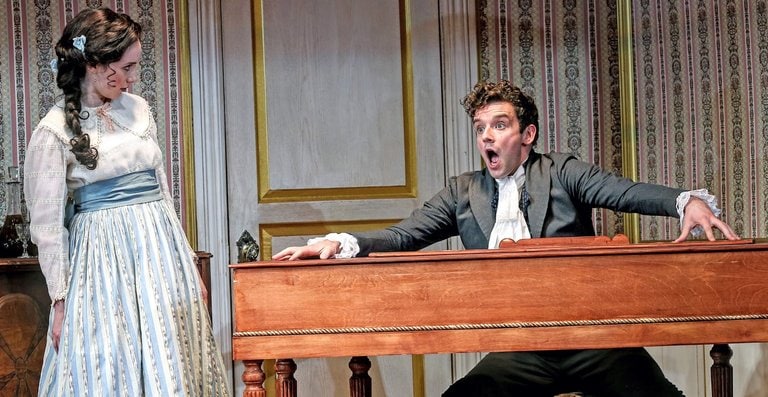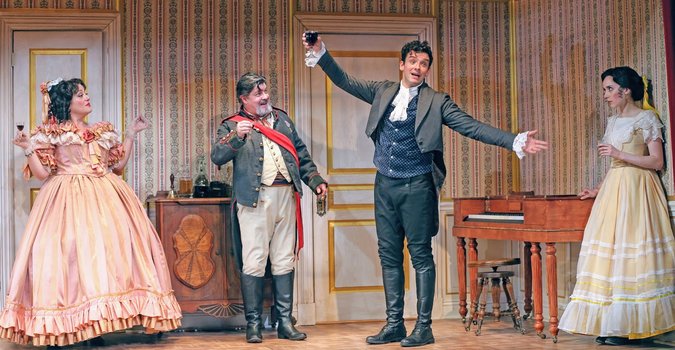The New York theatre scene continues to offer variety and great fun with this post-Tony production of Nikolai Gogol’s masterpiece, The Government Inspector, as adapted by American playwright Jeffrey Hatcher. Jesse Berger has directed it keenly, and its three sets are presented on two levels; two on the ground floor, and one large room above. All three rooms are in a provincial Russian town and the year is 1836.
The premise is set immediately. A clever rapscallion called Ivan Alexandreyevich Hkestakov – an unemployed dandy with no money and no prospects – has been in town for two weeks and has set himself up in a local hotel. Accompanied by his servant, Osip, he’s been charging his room and all expenses to the Crown. This convinces the Mayor that Ivan is the actual government inspector whom the authorities had been tipped off to expect, incognito, to check up on corruption in the town. As there has been virtually nothing but corruption from almost everyone, this is great cause for concern; the Mayor immediately starts giving Ivan money to keep him happy. Almost everyone of prominence, all of whom have been skimming money from the unsuspecting for months, offer “loans” as well, with Ivan and all the contributors aware that they are not expected to be repaid.

Merchants arrive to urge Ivan to impeach the Mayor, for he has been demanding fees from them as well. Ivan agrees, and demands more “loans” from the merchants. He also makes overtures to the Mayor’s wife, who doesn’t seem to mind at all, though she pretends to, telling him she’s high class herself. “We were a family of culture. We had a book, and my Mother whistled,” she lets him know in no uncertain terms.
A cast of fourteen play some 23 roles, and seem to be having a good time doing so. Headed by Michael Urie as Ivan, and Arnie Burton as both the Postmaster and the servant Osip, they offer us a good time as well.
Jeffrey Hatcher’s adaptation is fluid and well plotted, but only now and then hits the mark when aiming at genuine wit. Much of the dialogue reminds me how much more consistently David Ives has hit that mark with his dazzling adaptations of other foreign works of the period and later. A Flea In Her Ear and The School For Lies come to mind. Mr. Hatcher offers some fairly obvious double entendres about sex, and few really landed for me. Now and then a zinger will fly, and when it does, the audience is there for him.
The evening works because it is being played by three of the best comic actors we have. Michael Urie has found a role which allows his major gift for comedy to flourish. His drunk scene is classic, filled with invention, and hilarious. His attempt at suicide is another that should be studied by anyone interested in the art of low comedy. He’s attractive, vital, resourceful and he carries the play all evening long.
He is greatly abetted by Arnie Burton, who is emerging as another American actor who has learned to corral his talents and use them all, sparingly. He resists all temptation to overdo. He fills his readings with insight and variety, and squeezes laughs out of sometimes not very funny material. His scenes with Mr. Urie, just the two of them, are pure pleasure to witness.

Another actor who has been delighting us in a dozen plays and musicals, is Michael McGrath. (Spamalot, Nice Work If You Can Get It, Follies at Encores!). He plays the corrupt Mayor beautifully, somehow making him likeable even as we see him lying, coaxing, wheedling, betraying – in a word, he’s hopelessly flawed. But he doesn’t seem to know it, and he plays the Mayor as though his major task is to get away with everything.
The very funny Mary Testa, Drama Desk winner for “Three Decades of Outstanding Work,” is a brave and original comedienne. She is hilarious once again as the Mayor’s totally synthetic wife, but I found her about 10% over the top. Her “Anna Andreyevna” is for me a tad wilder than she need be. The others, including Mary Lou Rosato, Talene Monahon, Tom Alan Robbins, David Manis, Stephen Derosa, contribute mightily to the merriment.
The script is acceptable, but it is the incredible comic ability of the three male principals and most of the ensemble that lifts it into a show that is well worth seeing. If nothing else, it gives us a rare look at a marvelous social satire that unfortunately relates very easily to some of the folks with whom we share life on this planet today.
Alexis Distler’s set designs and Tilly Grimes’ costumes contribute greatly to the characterizations. Before the Mayor’s wife opens her mouth, her gown tells us much about her. That also applies to Mary Lou Rosato’s “Grusha” the maid, and the Mayor’s daughter “Marya.”
For a refreshing reunion or introduction to this success from 1836, I highly recommend a visit to the very attractive Duke Theatre on 42nd Street. The rows out front are nicely raked so there isn’t a bad seat in the house.
Running Time: Two hours and 10 minutes, with one intermission.
The Government Inspector plays through June 24, 2017, at Red Bull Theater performing at The Duke on 42nd Street – 239 West 42nd Street, in New York, NY. For tickets, call the box office at (646) 223-3010 ext. 8, or purchase them online.




